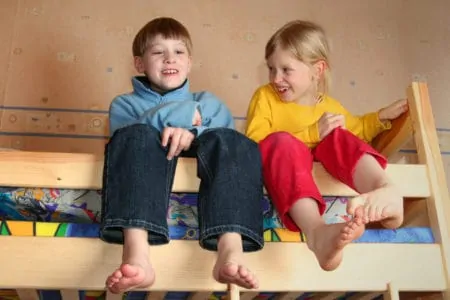How much sleep does my baby need? It is the million-dollar question keeping every parent awake at night.
We naturally compare our baby’s sleep habits to others. We worry they are sleeping too much or too little, and it is easy to feel defeated when a friend brags about their six-week-old sleeping through the night. You might wonder if something is wrong with your routine or your baby.
Let’s put those worries to bed. We will break down exactly how much sleep babies need by age, how to spot the “magic window” for sleep, and when a sleep pattern is actually a cause for concern.
Key Takeaways
- Newborns (0-3 months): They sleep in short bursts for about 14 to 17 hours a day, waking frequently for feeds due to tiny tummies.
- Infants (4-11 months): Total sleep drops to 12 to 15 hours. Nighttime sleep consolidates, and daytime naps become more predictable.
- Toddlers (1-2 years): Sleep needs decrease to 11 to 14 hours, usually consisting of one long night stretch and one or two naps.
- Routine is key: Consistent bedtime rituals and recognizing “wake windows” are the best tools for developing healthy sleep habits.
How Much Sleep Do Babies Need?
Every baby is unique, and individual sleep needs vary significantly. The numbers below are general guidelines, not strict rules. If your baby is alert, happy, and growing, they are likely getting enough rest (1).
Here is a breakdown of what to expect as your little one grows (2).
Newborn (0 to 3 Months)
Newborns operate on a 24-hour cycle of eating, pooping, and sleeping. They do not have a circadian rhythm yet, meaning they don’t know night from day.
Daytime Sleep
Newborns sleep in short bursts. You can expect about 8 hours of daytime sleep, but it won’t be continuous. It serves as a recharge between feeds.
Don’t expect your baby to sleep for more than a couple of hours at a time. Many newborns, however, do sleep long periods during the day due to “day/night confusion”(3). I typically recommend that parents wake a baby to feed after four hours of daytime sleep. This ensures that the baby is feeding well enough to gain weight and helps them begin to sleep longer periods at night.
Editor's Note:
Dr. Leah Alexander, MD, FAAPNighttime Sleep
Expect 8 to 9 hours of sleep at night, but this is broken up by frequent wakings. Their tiny stomachs need refilling every 2 to 4 hours.
Cluster feeding is also common. This is when your baby wants to eat every hour or so, usually in the evening. It often signals a growth spurt and can help them sleep a slightly longer stretch afterward.
One Month
At the one-month mark, your baby is becoming slightly more alert, but sleep patterns remain erratic (4).
Daytime Sleep
You can expect about 6 to 7 hours of daytime sleep. This usually happens across 3 to 4 naps.
Nighttime Sleep
Nighttime sleep totals around 8 to 9 hours. While they might sleep for slightly longer stretches, you will still be up for feedings.
Three Months
This is often a turning point. Your baby’s stomach is larger, and their body begins producing melatonin, helping them distinguish day from night. Total sleep requirements usually sit between 14 and 16 hours.
Daytime Sleep
Daytime sleep decreases to about 4 to 5 hours. You might start seeing a pattern emerge, such as a morning nap, an afternoon nap, and a short evening catnap.
This predictability makes it easier to plan nap time. Aim to put them down when they are drowsy but still awake to encourage independence.
Nighttime Sleep
Nighttime sleep increases to 9 or 10 hours. Some lucky parents might get a 5 or 6-hour stretch, which is technically considered “sleeping through the night.” However, waking for a feed or two is still biologically normal.
Six Months
At 6 months, sleep totals 14 to 15 hours. Most babies are physically capable of going longer without food at night, though comfort nursing or bottle-feeding is still common.
Sleep Regression and Object Permanence
Around this time, babies learn object permanence. They realize that when you leave the room, you still exist somewhere else. This can trigger separation anxiety.
If your baby suddenly starts waking up crying after months of good sleep, it is likely a sleep regression. This is temporary. Stick to your routine, offer reassurance, and try to help them self-soothe without creating new dependency habits.
Teething pain often becomes evident at this age and can disturb sleep. You may notice your infant softly crying while asleep or waking up with a more vigorous cry every one to two hours. The most common reason for this is painful gums (5). If you notice this pattern, you may want to discuss teething remedies with your baby’s doctor.
Editor's Note:
Dr. Leah Alexander, MD, FAAPNine to 18 Months
Total sleep needs remain around 14 hours. The biggest change here is the consolidation of naps.
The Nap Transition
Most babies this age take two naps a day (morning and afternoon). Around 15 to 18 months, many toddlers transition to one long afternoon nap.
Separation anxiety can peak again during this phase (6). Consistency is your best defense.
18 to 24 Months
Toddlers generally need 11 to 14 hours of total sleep. Most will take one nap lasting 1.5 to 3 hours and sleep 11 to 12 hours at night (7).
Bedtime battles may begin as your toddler tests boundaries and suffers from “FOMO” (fear of missing out).
Is My Newborn Sleeping Too Much?
Newborns are growing rapidly, and growth requires energy. It is normal for them to wake, eat, poop, and fall immediately back asleep.
The main thing to watch is hydration and weight gain. Your newborn should wake to feed 8 to 12 times in a 24-hour period. If they are sleeping through feeding times, you may need to wake them, especially in the first few weeks (8).
Reasons for Extra Sleep
Sometimes a healthy baby sleeps more than usual due to:
- Growth spurts: The body works hard to grow, requiring extra rest.
- Developmental leaps: Learning new skills like rolling or crawling is exhausting.
- Minor illness: The body sleeps more to fight off colds or infections.
Warning Signs
Contact your pediatrician if your baby shows these signs of dehydration or illness (9):
- Lethargy: They are hard to wake or do not respond to stimulation.
- Dry diapers: Fewer than four wet diapers in 24 hours.
- Concentrated urine: Urine appears dark yellow or smells strong.
- Poor feeding: They show no interest in eating or have a weak latch.
Be Careful About Dehydration
How To Help Your Baby Sleep Better
Timing is everything. If you miss your baby’s “sleep window,” their body produces cortisol and adrenaline. This makes them overtired, wired, and much harder to settle.
Here are the classic signs of an overtired baby (11):
- Crankiness: They are fussy and difficult to please.
- Arching back: They fight being held or put down.
- Rigid movements: Their body becomes stiff or jerky.
- Second wind: They seem hyperactive or “wired.”
Watch for “Wake Windows”
A “wake window” is the amount of time a baby can happily stay awake between naps. As they grow, these windows stretch.
- Newborns: 45 to 60 minutes.
- 3 Months: 1.5 to 2 hours.
- 6 Months: 2 to 3 hours.
Signs of Sleep Readiness
Catching your baby before they are overtired is the secret to easier bedtimes. Look for these early cues (12):
- The glazed look: They stare into space or avoid eye contact.
- Red eyebrows: The skin around the eyebrows and eyes turns pink.
- Jerky movements: Hands and feet might move unsteadily.
- Rubbing eyes: A classic sign that sleep is needed immediately.
Tips for Success
- Check the basics: Ensure a dry diaper and a full tummy (13).
- Set the scene: Use blackout curtains and white noise to create a sleep-inducing environment.
- Pause before pickup: Newborns are noisy sleepers. If they grunt or whimper, wait a moment to see if they settle back down on their own.
- The soothing touch: If your baby is fussing, try placing a hand on their chest or patting them before picking them up.
Creating a Bedtime Routine
A predictable routine signals to your baby’s brain that sleep is coming. You can start a simple routine as early as 6 to 8 weeks old (14).
Newborn Strategy
Strict routines don’t work well for newborns, but you can avoid creating difficult habits.
- Keep nights dull: Keep lights low and voices quiet during night feeds.
- Keep days bright: Expose them to natural light and household noise during the day.
- Rotate soothers: Don’t let mom be the only person who can put the baby to sleep.
The 3-Month Routine
By 3 months, you can implement a structured sequence. Consistency is key.
- Bath time: A warm bath relaxes the muscles.
- Massage: Use baby lotion for a gentle massage.
- Quiet time: Dim the lights and rock or sway.
- Bed: Lay them down while drowsy.
6 to 18 Months
As your baby gets older, the routine can include more interaction.
- Bath: Wash away the day.
- PJs: Put on fresh pajamas and a sleep sack.
- Story: Read one or two short books.
- Song: Sing a specific lullaby that signals the end of the day.
- Sleep: Into the crib awake.
There is no “right” way to handle sleep training. Whether you choose a gentle method or “cry it out,” consistency is what matters most for your family.
Toddler Tactics (24 Months)
Toddlers are masters of stalling. They suddenly need water, another hug, or to tell you about a rock they saw three days ago.
- Be boring: If they get out of bed, calmly walk them back with zero engagement.
- Be firm: “It is sleep time now.” Do not negotiate.
- Use a visual timer: A color-changing clock can help them understand when it is okay to get up.
In clinical practice, parents often say that their toddler is more compliant with one parent or caregiver at bedtime but not with another. In these situations, we recommend that both participate in the bedtime routine. In this way, the toddler does not receive confusing messages and cannot pit one parent against the other.
Editor's Note:
Dr. Leah Alexander, MD, FAAPWhen Will My Baby Sleep Through The Night?
This is the holy grail of parenting.
Biologically, most babies are capable of sleeping a 6 to 8-hour stretch by 6 months old. However, “capable” and “willing” are two different things.
Growth spurts, teething, illness, and developmental milestones (like learning to stand) will disrupt sleep. A baby who slept perfectly at 5 months might wake every two hours at 6 months.
Try to let go of the “super sleeper” comparison. If your baby is happy and you are finding a rhythm that works for your family, you are doing a great job.






